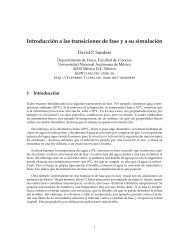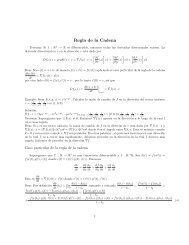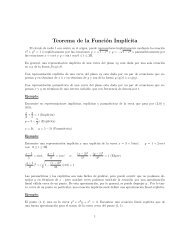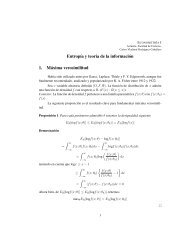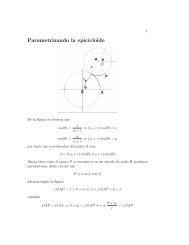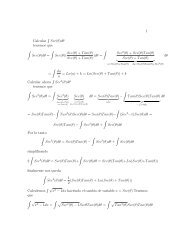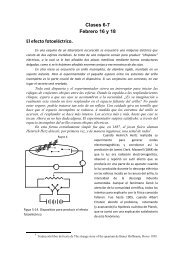"Surely You're Joking, Mr. Feynman!" - unam.
"Surely You're Joking, Mr. Feynman!" - unam.
"Surely You're Joking, Mr. Feynman!" - unam.
You also want an ePaper? Increase the reach of your titles
YUMPU automatically turns print PDFs into web optimized ePapers that Google loves.
some other experiment. I said, "Hell, I'll just give you the ribosomes we've got. We have<br />
plenty of them in my refrigerator at the lab."<br />
It would have been a fantastic and vital discovery if I had been a good biologist.<br />
But I wasn't a good biologist. We had a good idea, a good experiment, the right<br />
equipment, but I screwed it up: I gave her infected ribosomes the grossest possible<br />
error that you could make in an experiment like that. My ribosomes had been in the<br />
refrigerator for almost a month, and had become contaminated with some other living<br />
things. Had I prepared those ribosomes promptly over again and given them to her in a<br />
serious and careful way, with everything under control, that experiment would have<br />
worked,, and we would have been the first to demonstrate the uniformity of life: the<br />
machinery of making proteins, the ribosomes, is the same in every creature. We were<br />
there at the right place, we were doing the right things, but I was doing things as an<br />
amateur stupid and sloppy.<br />
You know what it reminds me of? The husband of Madame Bovary in Flaubert's<br />
book, a dull country doctor who had some idea of how to fix club feet, and all he did was<br />
screw people up. I was similar to that unpracticed surgeon. The other work on the phage I<br />
never wrote up Edgar kept asking me to write it up, but I never got around to it. That's<br />
the trouble with not being in your own field: You don't take it seriously.<br />
I did write something informally on it. I sent it to Edgar, who laughed when he<br />
read it. It wasn't in the standard form that biologists use first, procedures, and so forth. I<br />
spent a lot of time explaining things that all the biologists knew. Edgar made a shortened<br />
version, but I couldn't understand it. I don't think they ever published it. I never published<br />
it directly.<br />
Watson thought the stuff I had done with phages was of some interest, so he<br />
invited me to go to Harvard. I gave a talk to the biology department about the double<br />
mutations which occurred so close together. I told them my guess was that one mutation<br />
made a change in the protein, such as changing the pH of an amino acid, while the other<br />
mutation made the opposite change on a different amino acid in the same protein, so that<br />
it partially balanced the first mutation not perfectly, but enough to let the phage operate<br />
again. I thought they were two changes in the same protein, which chemically<br />
compensated each other.<br />
That turned out not to be the case. It was found out a few years later by people<br />
who undoubtedly developed a technique for producing and detecting the mutations faster,<br />
that what happened was, the first mutation was a mutation in which an entire DNA base<br />
was missing. Now the "code" was shifted and could not be "read" any more. The second<br />
mutation was either one in which an extra base was put back in, or two more were taken<br />
out. Now the code could be read again. The closer the second mutation occurred to the<br />
first, the less message would be altered by the double mutation, and the more completely<br />
the phage would recover its lost abilities. The fact that there are three "letters" to code<br />
each amino acid was thus demonstrated.<br />
While I was at Harvard that week, Watson suggested something and we did an<br />
experiment together for a few days. It was an incomplete experiment, but I learned some<br />
new lab techniques from one of the best men in the field.<br />
But that was my big moment: I gave a seminar in the biology department of<br />
Harvard! I always do that, get into something and see how far I can go.<br />
I learned a lot of things in biology, and I gained a lot of experience. I got better at



